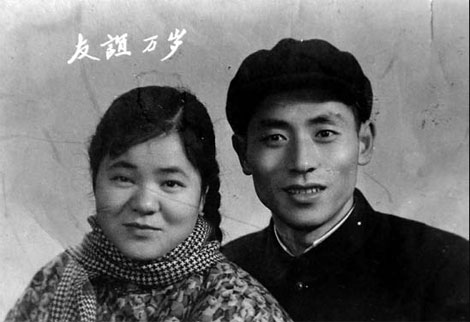 |
Large Medium Small |
|
 A luxurious wedding held on a yacht in Guangzhou in 2001. A wedding often costs tens of thousands yuan. Photos from China Photo Press |
Attitudes to love and marriage continue to change since the first Marriage Law was introduced in 1950, and have to play catch-up with people's evolving love lives since then. Chihua Wen reports
Wu Bo, the 55-year-old mother of a 23-year-old unwed son, was taken aback when Ma Nuo, 22, a model from Beijing said on China's most popular TV reality program Don't Bother Me: "I'd rather weep in a BMW than smile on the bicycle of my true love."
"I don't like to generalize, but Ma's words show that young women today worship money. They won't get married unless their boyfriends have a house and a car. They're so mercenary," Wu says.
A civil servant in Chengdu, Wu remembers her own younger days in the 1980s as being rosy and romantic.
"Material success was not so important to my generation. Most of my peers wanted to find a mate who was a spiritual match more than one who was materially rich."
|
 A wedding picture from the 1960s features Xiao Fa and his bride Li Cuiping from Hunan province. The Chinese characters are "You Yi Wan Sui", or "Long Live Friendship". |
"Being materialistic is not our fault. Our whole society is already that way," says Sun Mei, 24, a project officer with a Canadian company in Beijing.
"If I marry a poor man for love, I will lose face, and the quality of my life will be worse than if I were single."
"Ideas of marriage and Chinese values have taken three sharp turns over the last 60 years since the first Marriage Law was promulgated on May 1, 1950," says Chen Mingxia, a professor with the Institute of Law of Chinese Academy of Social Sciences.
The Marriage Law gave people the freedom to marry who they wanted and banned such practices as multiple wives, concubines, child marriages, and the bride price.
"The freedom to marry was one of the most significant signs of social change in the 1950s," says Chen.
Hu Yongquan, 83, was born to a wealthy landlord and his first marriage was arranged. However, in 1952 armed with the Marriage Law, Hu divorced his first wife from his arranged marriage and married Lin, the woman he loved, who was from a merchant family.
"My father threatened to disown me if I married her, and when her father learned we were dating, he locked her up. But I told my father, 'It's a new society now. Everyone has the freedom to choose their own partner'. We lived happily after that," says Hu.
Yu Ma, 52, an antique dealer from Chongqing, recalls that his first two girlfriends both left him because his father was denounced as a rightist in 1958.
"Their parents worried that my politically-stained family would damage their future," he says.
In those years, in addition to the parents' approval, couples had to seek the approval of the authorities at their workplace, or from the neighborhood committee before they could get married.
While the freedom to marry for love had become socially acceptable, divorce was not. As in marriage, couples had to get the permission of authorities before they could divorce.
Tong Zhuming (not his real name) was a military officer based in Urumqi, capital of the Xinjiang Uygur autonomous region, in 1970 aged 29, he sought permission to marry his girlfriend. It was denied after the military authorities found his girlfriend "political unreliable" as her uncle was in the United Sates. Instead, the authorities arranged for him to marry a miner's daughter from Tianjin.
|
A newly married couple in the 1980s pose in front of the double happiness character. |
"I seldom felt happy in this marriage," recalls Tong's wife, Tang. "I felt trapped. In those times, I couldn't ask for divorce because it was a military marriage."
A military marriage, between a civilian and the other a serviceman, was provided special legal protection: unless the serviceman agreed, the divorce would not be granted by a court.
"Tong didn't want a divorce, not because he loved me, but because he wanted to put up a good front for his parents. A divorce would effect his chances for promotion, and make his parents lose face," says Tang.
The 1980s saw marriage values in China taking a second turn.
In 1980, Yu Luojin, a writer in Beijing, filed for divorce, claiming she was no longer compatible with her husband. But, incompatibility was not legal grounds for divorce under the existing Marriage Law. The term incompatibility was so foreign that Yu's appeal triggered a social controversy about the reasons for divorce.
With Yu Luojin's case, the 30-year-old Marriage Law no longer met the needs of the contemporary social landscape.
In 1980, the first amendment to the Marriage Law was issued. Incompatibility was written into the articles of the new Marriage Law.
"People realized that love could be the reason for a marriage. They gradually gave up the old idea of sex as reserved for having children. They began to see sex as a way of expressing love and affection, and for the pleasure of body and soul," says Chen Mingxia.
Love, affection and enjoyment became the standard by which many people judged the quality of their marriage.
However, following the amendment to the Marriage Law, the 1980s witnessed an unprecedented divorce rate in China. Numerous couples, many of whom were sent to the countryside as teenagers during the "cultural revolution" (1966-76) and had marriages with local peasants for practical reasons, got divorced when they returned home after the revolution.
Later the influence of Western-style sexual liberation affected marriage stability and in the 1990s, some old practices returned.
Keeping an er nai, a concubine, or second wife, became a social phenomenon in big cities like Shenzhen, Guangzhou, Beijing and Shanghai. Many young women of low social status were willing to be kept by wealthy older men. Some even bore children with their sugar daddies.
"This not only jeopardized the legal rights of the women in the marriage. The rights of the er nai and their illegitimate children couldn't be realized either," says Chen Mingxia.
The Marriage Law was amended again to meet these new social changes. In 2003, a second amendment to the Marriage Law was issued. In it, cohabitation of a married person with any third party was prohibited. It stipulated that man and wife should be faithful to each other, and respect each other.
Nowadays, another remarkable phenomenon in Chinese relationships has emerged, namely shan hun or "lightning marriages". In this case, a couple gets married shortly after their first date.
Most of the couples who enter into such quick marriages are people born in the 1980s. Unlike their parents, this generation is coming of age in an era of exploding wealth and rising expectations for material success.
No specific figures are available for lightning marriages. However, it seems clear that quickie marriages risk a quickie divorce. The latest figures from the Ministry of Civil Affairs reveals that, in 2009, China had 2.48 million divorces, an 8.8 percent rise over 2008. Many were the result of lightning marriages.
"Most 1980s people are only children. They are self-centered and not tolerant in relationships," says Chen. "If they want something, they want it now, the same with their relationships. They are prone to get divorced quickly instead of taking time to improve themselves and become more tolerant."